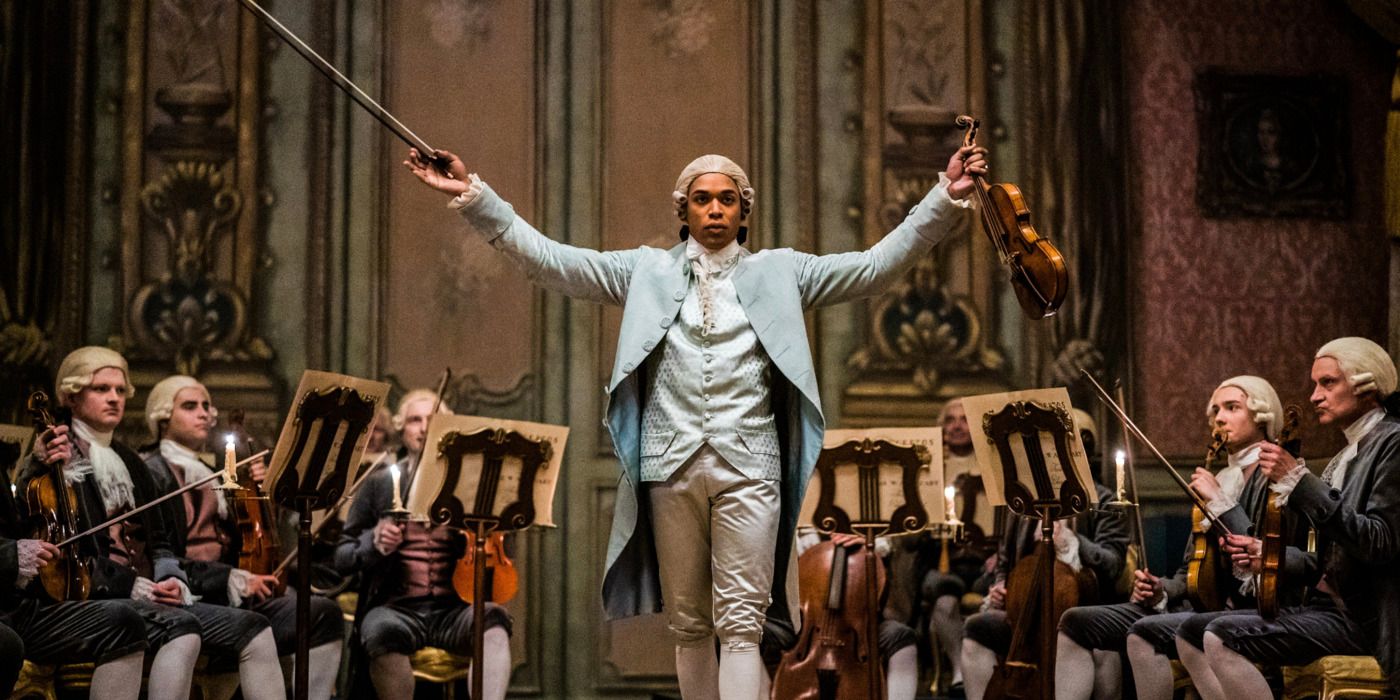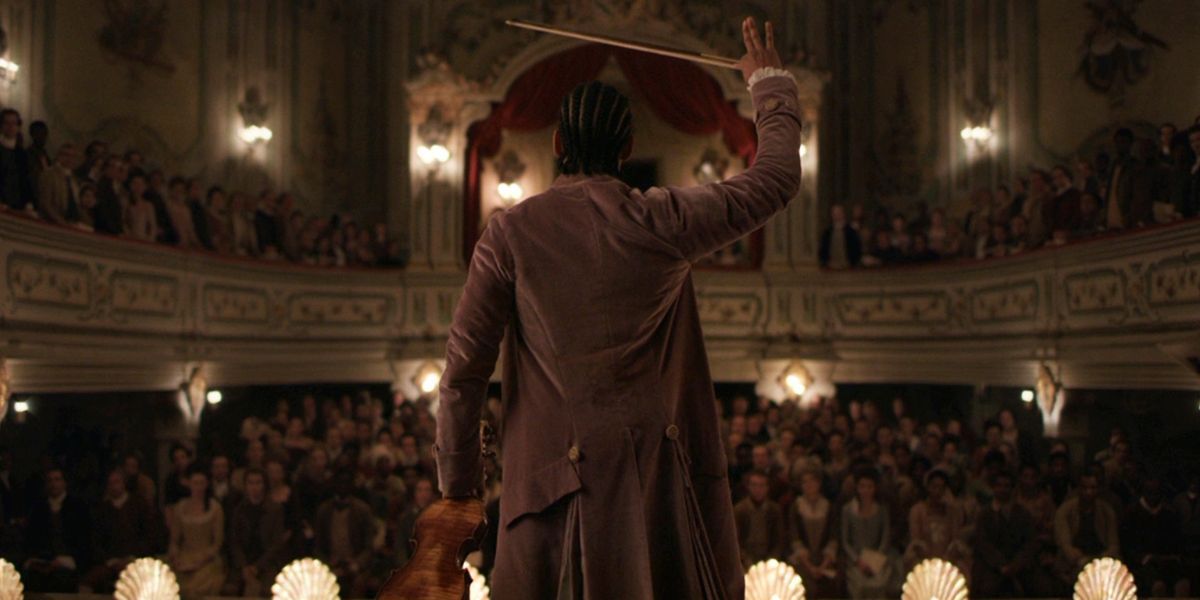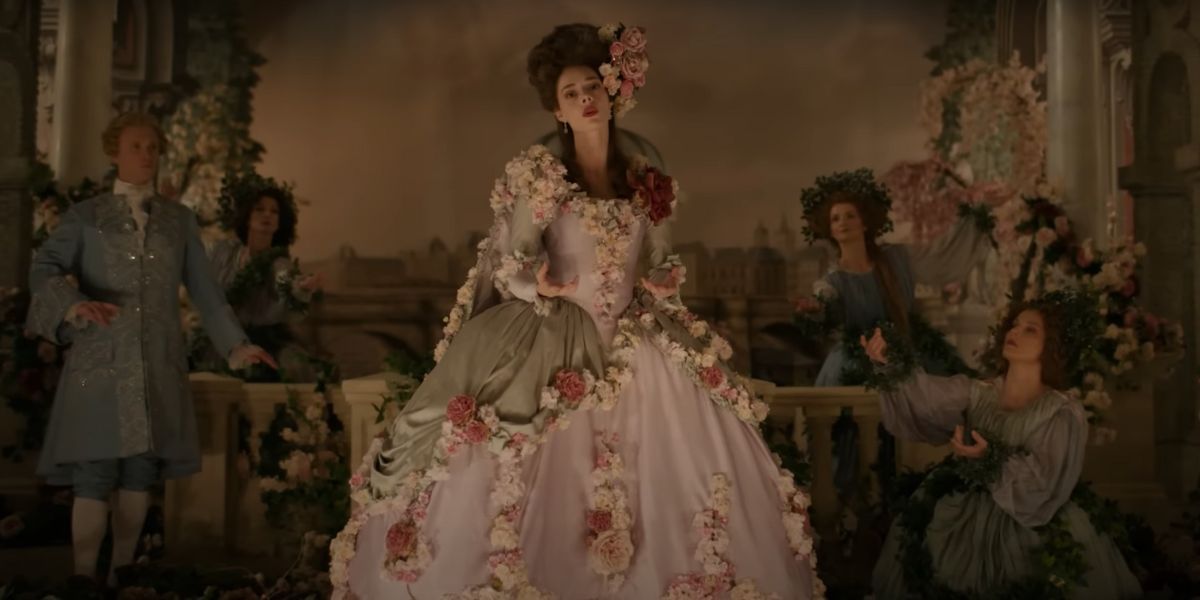Every year, Hollywood turns its gaze upon a new well-known figure to transform into the next high-profile, glossy biopic. These films, such as Elvis, Bohemian Rhapsody, and Rocketman, often aim to entertain audiences, rather than attempt to uplift relatively unknown stories. As thrilling as it may be to see the lives of iconic figures set to the aesthetic stylings of Baz Luhrmann, there’s something to be said about harnessing the truths of history’s forgotten figures and transforming them into timeless tales.
Stefani Robinson’s tight script does just that by expertly marrying the facts of Joseph Bologne’s remarkable life with fictitious inspiration that transforms Chevalier into a story that fully captures the audiences’ interests. The story works in perfect concert with Stephen Williams’ direction, which capitalizes on the grandeur and extravagance of the Rococo era, all the while playing to the delicacies of Bologne’s existence. After all, he was a man of dueling identities—one which was praised and revered for his musical talents, and the other loathed for merely existing in a space that othered him.
Joseph Bologne was a man that history desperately sought to expunge from its records, nearly robbing a man of a legacy that could have—and should have—rivaled musical greats like Wolfgang Amadeus Mozart. It’s this imagined rivalry that serves as the opening for the film, as Bologne (Kelvin Harrison Jr.) challenges Mozart (Joseph Prowen) to a duel (with violins, not guns) before an audience of bemused onlookers. This scene sets the stage for the thesis of the film by showcasing Bologne’s talents and forcing the audience to consider why they have never heard of him before now. He had fame and notoriety as the Chevalier de Saint-Georges, but neither could protect him from the fact that he was a Black man living in a white man’s world.
Throughout Chevalier, Bologne is shown as a man who is striving to push beyond the constraints of his existence. Gaining the favor of Marie-Antoinette (Lucy Boynton) and earning the title of Chevalier de Saint-Georges is not enough for him. His aspirations are larger than life as he seeks to break through barriers that restrict him. However, like Icarus, flying too close to the sun, Bologne’s ambitions—in many areas of his life—are also his downfall. With the societal capital he possesses as a mostly respected member of Marie-Antoinette’s court, Bologne begins to pursue his next goal of becoming the leader of the Paris Opera. To achieve this, he mounts the composition of an opera, which he hopes will propel his career upwards. It’s this opera that draws the beautiful and vocally talented Marquise Marie-Josephine (Samara Weaving) into his world, setting it aflame with passion and, ultimately, scandal.
Despite her husband, the Marquis de Montalembert’s (Marton Csokas), clear demands that he does not want a wife on the stage, Bologne and Marie-Josephine throw caution to the wind on several fronts. While this tragic romance may seem like the stuff of fictitious romanticization, gossip writers of the era speculated that Bologne and the Marquise did in fact have an affair that resulted in a son— whom he lost. The aforementioned references to Luhrmann’s cinematic flare are not without reason, as Chevalier appears to borrow from one of his more iconic works—Moulin Rouge!—when the Marquis storms into Bologne’s performance with a gun drawn, ready to make him pay for his wife’s affair. It is always exciting to see how visual cues from other works can be woven into new films, thus strengthening the language shared by cinema as a whole.
While the romance between Marie-Josephine and Joseph is one of the most plot-propelling aspects of Chevalier, it is also one of its few weaknesses. Harrison Jr. has surely cemented himself as the perfect, musically talented, and delightfully charming romantic lead—with both this film and Cyrano on his resume—but his chemistry with Weaving is not allowed enough time to fully blossom here. Instead, the film opts to rush through the first blush of romance, straight into the bedroom, simply to benefit the film’s length. With the downfall of this romance such a key point in the final act, it feels like a disservice to relegate their connection to the edges of the plot. Though, perhaps this was an intentional jab at the way history has similarly pushed Bologne to the footnotes.
Rather than approaching Bologne’s story in the typical biopic styling (from cradle to grave), Robinson’s script allows for brief backward glances at his adolescence, while remaining squarely rooted in the Rocco-era present. With the backdrop of the looming French Revolution always just at the periphery—thanks to his radicalized friend Philippe (Alex Fitzalan)—the film’s conclusion arrives at the doorstep of vive la révolution, leaving audiences to satisfy their own curiosity about Bologne’s future. It’s a clever tactic that inspires further interest, keeping the focus on a story purposefully left untold by history.
With Oliver Garcia’s exquisite costumes and Karen Murphy’s production design, both brought alive to their full potential by Jess Hall’s stunning cinematography, Chevalier is not just a compelling story, it’s a visually compelling one too. Chevalier will linger with its audience, hopefully long enough to bring Bologne’s contributions to music back into academic conversations.
Rating: B+
Chevalier is in theaters starting April 21.



